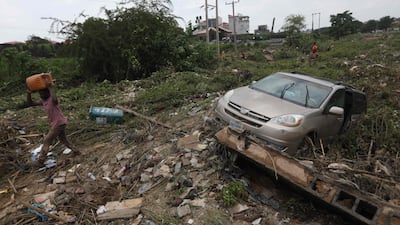Countries at risk of climate disaster have called for a transparent and smooth process of grants and not loans from the loss and damage fund, as well as dedicated allocations for the most vulnerable nations.
Parts of Asia and Africa, ranked as extreme disaster-prone by the United Nations and hit hard by drought, heatwaves, flood and storms, said a clear and timely distribution mechanism worked out by the end of Cop28 would benefit at-risk populations.
Salah Jama, Somalia’s deputy prime minister, said quick distribution of funds would help devastated populations get back on their feet.
He said a “just and fair” fund would help his “people caught between floods and famines for things we had very little to do with”.
Local Environment Development and Agricultural Research Society
“People have lost livestock, their livelihood and means of survival and production,” Mr Jama told The National.
“It’s morally imperative for the fund to contribute to develop adaptation programmes for these communities with support in terms of climate finance, technology and infrastructure investment.”
Floods hit Somalia this year after the worst drought in four decades killed more than 43,000 people, half of them children, last year. Five million people face crisis levels of hunger, making recovery a challenge, according to the World Food Programme.
“For a country like Somalia and many others in Africa and other regions within the developing world, the loss and damage fund is a very important priority because these countries and their populations have had very little to do with the deterioration occurring due to climate change, especially in greenhouse gas emissions,” Mr Jama said.
Managing the fund
Extreme weather in countries such as Somalia, Bangladesh, Nepal and Nigeria kill livestock, destroy farms, raise food prices and push people further into poverty.
Government ministers and officials said the funding would help farmers to grow crops and families to afford basic meals.
How much funding will be allocated to each country is a sticking point.
The overall fund stands at more than $500 million, with pledges from the UAE, Germany, the UK, the EU, Japan, Denmark, Canada and the US.
Non-government organisations have asked for distribution in the form of grants because affected countries are poor and have limited capacity to take on additional debt burden.
“Loss and damage means it has already happened so if you give me a loan and impose a business model, it will be an injustice for me,” said Mohon Mondal, head of the Local Environment Development and Agricultural Research Society that provides drinking water to Bangladesh's coastal communities.
“You need to compensate me so I can rebuild my house.
“If you try to give loans to the poorest countries instead of compensation, we have no capacity to pay.”
He said how the fund was managed would be the key.
“We are very optimistic about this fund but the major concern is who will manage the fund. We are hoping for an independent committee and are waiting to see what happens at the end of this Cop,” Mr Mondal said.
Dedicated to most at risk
In Nepal, where heavy rains and landslides have destroyed crops and damaged homes, the government is hoping the fund will be relatively straightforward.
“If loss and damage follows a long and complicated process then the victims of climate change are not going to benefit from this fund,” said Maheshwar Dhakal, joint secretary of Nepal’s Ministry of Forest and Environment.
“That’s why we have to be very serious to make it a simple process [with] dedicated allocation for the most vulnerable countries.”

The Himalayan nation is keen to rebuild broken infrastructure.
“We need separate and more dedicated funds for loss and damage to countries like Nepal where the people are directly impacted,” said Mr Dhakal.
“Nepal has erratic rainfall; melting glaciers cause landslides and flooding that hurts us every year.
“It damages infrastructure and this directly hits the economy because farmlands and transport systems collapse.”
Funding will support people by rebuilding livelihoods.
“These mountainous regions also produce huge quantity of fresh water and can supply people for irrigation, drinking water or hydropower,” Mr Dhakal said.
“We also need transfer of technology to build the capacity of vulnerable communities.”
Starting point
Africa, home to 32 of the world’s 48 least developed countries, is on the frontline of the climate crisis.
Officials welcomed work on the fund but said quick action was required.
Michael Ivenso, director of energy, transportation and infrastructure at the Nigeria National Council on Climate Change described it as a breakthrough.
“The loss and damage conversation has been going on for decades, so the fact that there's a breakthrough is a move forward in the right direction,” he said.
“The fact we have a commitment from the Global North and some measure of concurrence from the Global South is a giant leap forward for everyone.
“But I do also know some commitments made so far have been short of expectations.”
Prof Joseph Longunza Malassi, an adviser to the Minister of the Environment at the Democratic Republic of Congo, said the loss and damage fund should only be viewed as a starting point for funding opportunities.
“This is a fund that we have been calling for more than a decade,” he said.
“When it comes to damage and loss related to climate change, the need is huge throughout the world.
“It's a very small step, but it's better to start somewhere in Africa, a long journey starts with the first step.
“Let countries come together, let the discussions and the negotiations continue so that we may have this fund grow.
“The most important thing is the commitment and willingness to start somewhere.”











